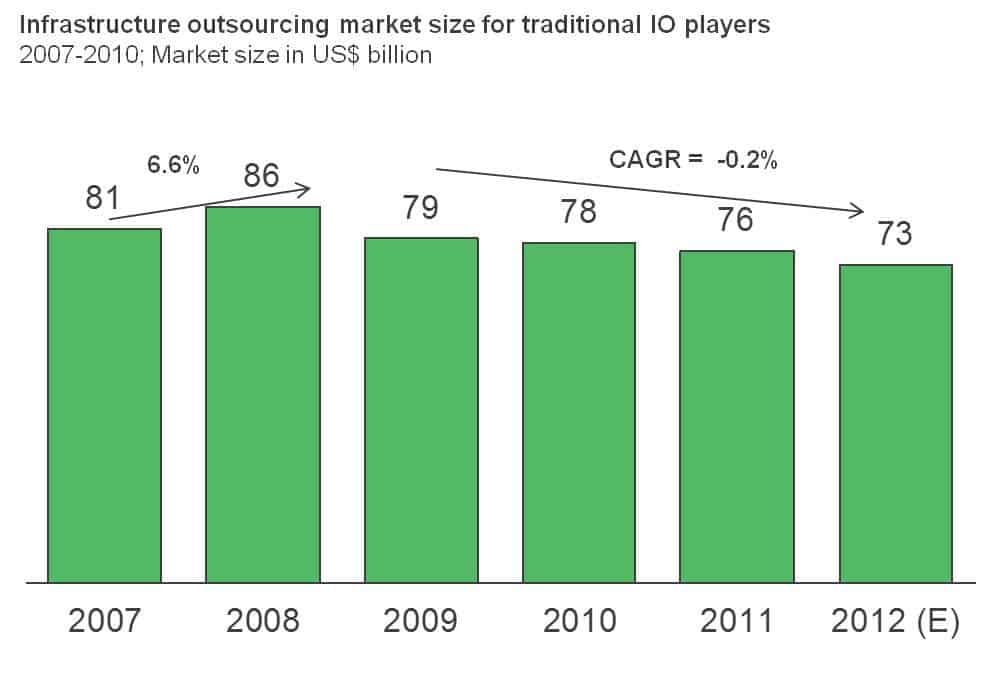Blog
Demystifying Industry Cloud | Blog

Microsoft recently rolled out its first industry cloud, Microsoft Cloud for Healthcare, combining capabilities across Dynamics 365, Microsoft 365, Power Platform, and Azure, to help improve care management and health data insights. Not so long ago, SAP’s CEO, Christian Klein, counted the company’s newly launched industry cloud among its growth drivers, and rightly so. Since its launch, SAP’s industry cloud has seen a long line of suitors rallying to partner in and build different vertical cloud offerings on top of it. In June 2020, there was Deloitte, then Accenture, and, most recently, Wipro.
Having analyzed this specific market trend throughout 2020, we at Everest Group have realized that, with all kinds of cloud providers jumping on to the industry cloud bandwagon, confusion abounds on what truly is an industry cloud.
So, what’s the buzz about? What is an industry cloud?
Simply put, an industry-specific/vertical cloud is a cloud solution that has been optimized and customized to fit the typical nuances and specific needs of a particular industry vertical’s customers. It is designed to tackle industry-specific constraints such as data protection, retention regulations, and operations with mission-critical applications.
We believe that a true industry cloud solution is characterized by four different layers: the infrastructure and platform layers, followed by an application layer, which is further supplemented by customization and differentiation layers.
The infrastructure layer, dominated by industry-agnostic IaaS players such as AWS, provides the hardware, network, scalability, and compute resources. The platform layer, such as Azure’s PaaS offering, is built over this infrastructure layer and becomes the debugging environment for building applications.
The application layer comprises a horizontal cloud application such as Salesforce CRM and, in several cases, hosts development platforms, such as the Salesforce App Cloud, that become the marketplace for building additional functionalities.
The differentiation layer adds vertical nuances to a horizontal application such as built-in industry regulatory compliance. It is here that we see the industry cloud taking shape, but the offerings are still standard and not customized to the needs of specific enterprises.
The customization layer brings in service providers or technology vendors with their vertical expertise and decades of experience in working with enterprises. They partner with providers of differentiated cloud offerings, and build tools and accelerators to further customize them to suit enterprise needs, adding capabilities such as AI and security, personalized dashboards for analytics, and integration services to build a truly industry-specific/vertical cloud offering.
We have illustrated this architecture in the exhibit below, taking the example of Veeva Systems, a popular provider of industry cloud solutions for life sciences. Veeva started as a CRM application built on the Salesforce platform, designed specifically for the pharmaceutical and biotechnology industries. Salesforce provided the infrastructure, platform, and application layers, while Veeva added a differentiation layer with a data model, application logic, and user interface tailored to support the pharmaceutical and biotechnology industries. It leveraged the standard Salesforce reporting, configuration, and maintenance capabilities.
Exhibit: Understanding the industry cloud architecture through Veeva industry cloud

Over time, Veeva has cultivated an ecosystem of partnerships, including service providers such as Accenture (Veeva CRM partner) and Cognizant (Veeva Vault partner). These partners leverage the Veeva development platform to build additional applications customized to enterprise needs, thereby adding the final customization layer to Veeva’s solutions suite.
Industry cloud is gaining significant traction among industries
Industries such as healthcare and banking – which require rapid and auditable deployment of new features or functionalities to comply with regulatory changes – are rapidly adopting industry cloud. Healthcare continues to lead the charge from a vertical standpoint, but many industries are experiencing an uptick in adoption, including manufacturing, financial services, and retail.
The key reasons for this growth are:
- Lowered barriers to cloud adoption, along with a ready-to-use environment with tools and services tailored to a specific vertical’s operational requirements
- Accelerated innovation, lower costs, and reduced risks
- Efficient handling of data sources and workflows, and compliance with the industry’s unique standards
- Support for industry-standard APIs, helping companies connect more easily and securely, accelerating the DX economy
- Access to industry insights or benchmarks through data aggregation from multiple clients within the same industry
What can organizations expect in the near future?
With the one-cloud-fits-all-approach reaching maturity, the next decade will be marked by the depth of vertical expertise and customization capabilities that can complement existing applications and address customer pain points. Different kinds of vendors are developing industry cloud solutions, ranging from hyperscalers such as Azure and GCP, to vertical-specific players such as Veeva. We will cover the industry cloud market in further detail in parts 2 and 3 of this blog series, in which we will answer the following questions:
- What are the different kinds of industry cloud solution providers and their go-to-market strategies?
- What should enterprises do, and how should they source industry cloud solutions that best suit their needs?
The battle for industry cloud is only going to get fiercer in the near future. Please follow this space for more blogs on the emerging war and warriors in the industry cloud market. Meanwhile, please feel free to reach out to [email protected] or [email protected] to share any questions and your experiences.